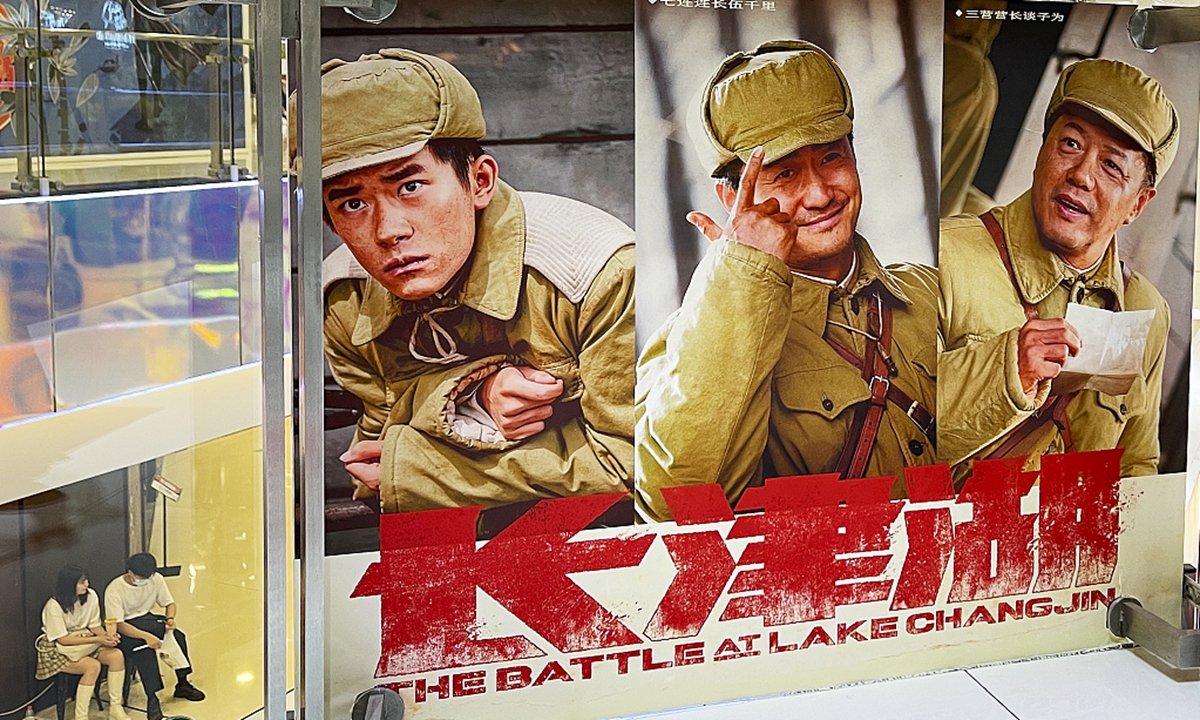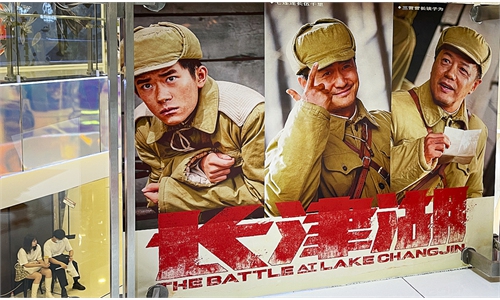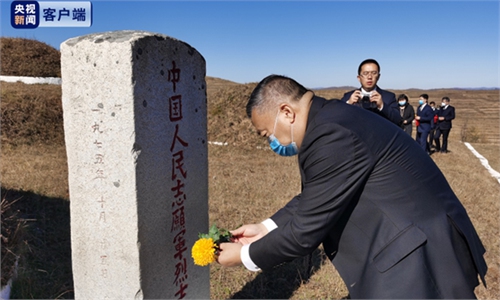Mainland Korean War-themed blockbuster hugely popular in HK, reminds youths of their hard-won prosperous life
Film to boost national identity awareness

A poster of the film the Battle at Lake Changjin. Photo: CFP
Chinese mainland's Korean War-themed blockbuster The Battle at Lake Changjin, the highest-grossing film worldwide in 2021, has debuted in Hong Kong and Macao special administrative regions on Thursday. The film was immediately met with full bookings throughout the following weekend, drawing tremendous popularity among the local communities, especially the youths.Residents in Hong Kong reached by the Global Times expressed their appreciation and respect for the film and the heroes it has depicted. They believe the film is of such great importance to the Hong Kong people that it makes them cherish today's hard-won prosperity and peace, and could boost their national identity awareness.
Cinemas in Hong Kong including Emperor Cinema, The Sky, Premiere Elements, My Cinema YOHO Mall and K11 Art House told the Global Times on Thursday that tickets from Friday evening to Sunday and some even till next Tuesday had been sold out.
The ticket information on the website of Galaxy Cinemas, Macao Tower Cinema and Cinema Alegria in Macao, also show nearly full house of the movie, with less than 10 percent seats empty in the weekend.
Audience in Hong Kong rushed to the cinema at 10:30 am in Kowloon Bay on Thursday morning, after learning the movie's record-breaking box office in the mainland.
Derek Tsang, one of the movie-goers, told the Global Times that the house was full of audience who immersed themselves in the movie and washed themselves in tears. "Viewers burst out rounds of applause when the movie ended, showing their highest respect to the soldiers who sacrificed themselves for the safety and happiness of people today," Tsang said.
Hong Kong Special Administrative Region (HKSAR) Financial Secretary Paul Chan Mo-po attended the premiere on Wednesday, noting that the countless sacrifice of the martyrs depicted in the film are worth to be remembered, as it was them that allowed future generations - including today's Hong Kong - to be able to live in peace and harmony.
"The achievements that China has made are won through years of struggles. Today, China has become the second largest economy in the world, playing a crucial role in the international community and global governance, and all of these did not come easily," Chan told the Global Times after the premiere.
Chan noted that the film allowed people to take a look at the past to truly think about the significance of what the Chinese dream of great country rejuvenation has embodied. "Only by thinking about the significance of realizing the Chinese dream, can people, especially the youths in Hong Kong, actively participate in and contribute to the nation," Chan said.
Zoe Leung, vice president of Hong Kong Youth Innotech Association who attended the premiere, told the Global Times on Thursday that she "absolutely fancied it."
"In the Korean War [1950-53], I feel that the battles at Lake Changjin and Shangganling Mountain were particularly prominent, but they had been limited by the influence of international relations," Leung said. "However, this history should not be forgotten. The spirit of sacrificing one's life for righteousness should not be sealed, and the martyrs should be paid tribute to."
Chen Jie, a PhD candidate of the School of Chinese Medicine at the University of Hong Kong, recalled a particular scene where a soldier of the Chinese People's Volunteers said, "I hope the next generation will grow up in an era without war, and that we will fight all the battles we can so that our descendants no longer have to fight."
"Hong Kong is now in a similar period of recovery after a dark period of turbulence in history. I hope that after we have suffered all the pains in this period, our children in the future will not have to go through it again," Chen told the Global Times on Thursday.
Vanessa Dang, vice president of the Hong Kong Youth Innovation and Entrepreneurship Association, told the Global Times that it has made her realize that the current peace and stability are hard-won by heroes with flesh and blood sacrifices.
"By remembering their great deeds, we can better cherish the life we now have, and have stronger will to protect our motherland by doing the best we can."
The commemoration of martyrs carries special meaning to the youth of Hong Kong, Dang added. Only by learning more about the sacrifices that the country has made can they better understand the hardships of China's growth into today's prosperity and strength, and build a stronger sense of identity as a Chinese.
Jacky Ko Chung-kit, a 41-year-old Hong Kong online key opinion leader, watched the film immediately after release on Thursday. Ko told the Global Times that the most unforgettable scene for him is the soldier Yang Ruisi, who became an "ice sculpture" after he kept prepared for fighting in the freezing cold and was eventually frozen to death.
"Unlike the heroic American blockbusters that are always fictional, China's hero movies are based on actual history, presenting audience with the true national identity and characters," Ko said.
He expressed strong confidence in the mainland's film making industry, adding that famous Hong Kong directors like Tsui Hark and Dante Lam have also worked with mainland producers and contributed to the film.




